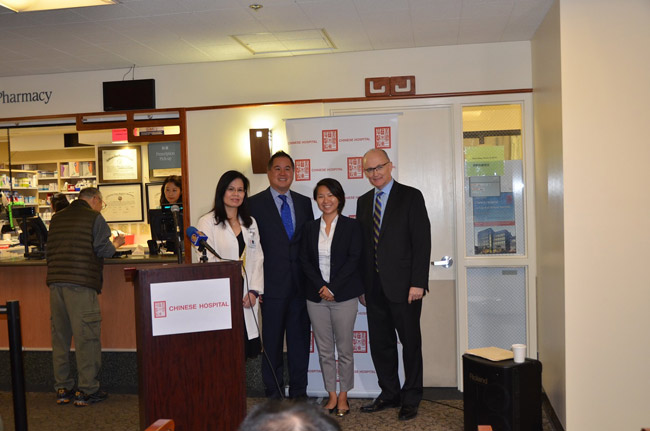
(San Francisco, CA) – Health experts joined Assemblymember Phil Ting (D-San Francisco) at Chinese Hospital to urge Governor Jerry Brown to sign legislation that will help 6.5 million Californians with limited English proficiency understand their medications by requiring pharmacists to distribute translations of drug information materials.
Ting’s Assembly Bill (AB) 1073 is now pending Governor Jerry Brown’s signature or veto by October 11. It is a breakthrough in what has been a years-long fight to help patients with limited English proficiency to access prescription medicine information that they can understand. Up to now, pharmacies have only been required to provide oral translation services over the phone.
“We need an equal standard of patient care. After years of fighting, we finally have a chance to ensure that all patients understand their medications,” said Ting. “By signing this bill, the governor will save lives and improve health care for millions of Californians. Pharmacy services are more important than ever to health care and language skills should never be an impediment to equal access.”
“Chinese Hospital is pleased to support this important bill authored by Assemblymember Ting,” said Jian Zhang, Chief Operating Officer, Chinese Hospital. “We have been providing this kind of cultural and language appropriate care to our community for over 100 years. We strongly believe this law will strengthen the communications we healthcare providers have with patients to ensure good health outcome for everyone.”
AB 1073 requires all pharmacists to provide translated directions for use to limited English proficient patients, which can be done through:
- Using translations made available by the Board of Pharmacy, which regulates pharmacists – the Board has translated for use in five languages (Chinese, Korean, Russian, Spanish, and Vietnamese) 15 standardized directions, such as “take one pill at bedtime” and “take one pill in the morning.”
- Providing their own translated directions for use – some pharmacies already offer patients comprehensive translation services, and are encouraged to continue doing so.
“A patient’s first and best source of information about their medication is the prescription label,” said Sarah de Guia, Executive Director of the California Pan-Ethnic Health Network. “Patients with limited English skills are over twice as likely to have difficulty understanding their medications. This bill will help make prescription labels understandable and meaningful for millions of Californians."
"This bill ensures the health and well-being of our limited English proficiency seniors," said Andy Bryant, Chief Operating Officer, Self Help for the Elderly. "Having prescription information in the appropriate language will prevent seniors from making unnecessary trips to the doctor or hospital because they will understand how to correctly take their medications for chronic conditions and brief illnesses. The bill will also help families and caregivers taking care of seniors since they are also often limited in their English proficiency."
The 2010 U.S. Census found over 6.5 million Californians speak English less than “very well.” And, 44 percent of Californians speak a language other than English at home. In San Francisco, according to the 2014 Language Access Ordinance Report, 36 percent of residents are immigrants. 45 percent over the age of 5 speak a language other than English at home - mostly Chinese, Spanish, Tagalog, and Russian. Thirteen percent of households remain linguistically isolated, meaning no one over the age of 14 speaks English “well” or “very well.”
AB 1073 passed the Assembly 79-0 and the Senate 40-0. Here is what other supporters are saying about AB 1073.
“Prescription medications are an important element of health care: adherence to medication regimens is a significant problem for many consumers. Is it one pill twice a day? Is that one pill every twelve hours? Or is it two pills in the morning and none at night? How long do I take the prescription?”
-Anthony Wright, Executive Director, Health Access California
“Access to health care requires effective communication between patients and medical professionals. AB 1073 would help limited-English proficient patients across California understand prescription drug information in their primary language, a need that can literally be a matter of life and death.”
-Xavier Morales, Executive Director, Latino Coalition for a Healthy California
“This bill will ensure all Californians, regardless of the language they speak, understand how to safely take their medication.”
-Sherry Hirota, Chief Executive Officer, Asian Health Services
Further information is available at http://www.leginfo.ca.gov.
#